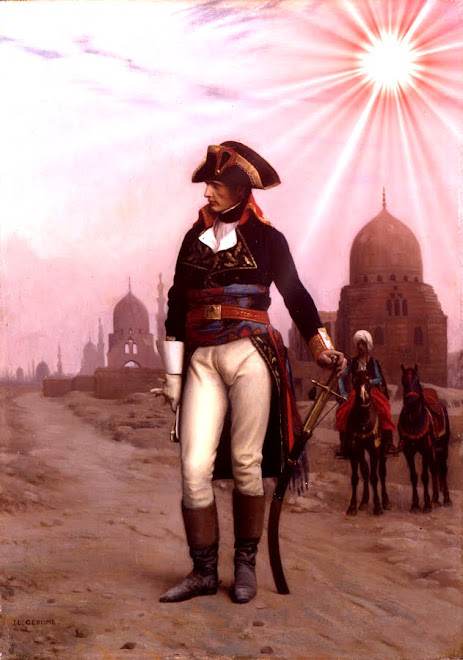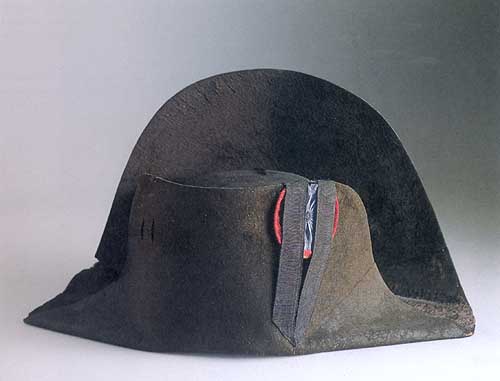Across ice and snow, through storm and shell, they followed him. They marched across the achingly dry deserts of Egypt and dragged their weary freezing bodies through the winter hell of Russia in 1812. They were soldiers on Napoleon, men of the Guard and with their hero Le Tondu to lead them, nothing was impossible.
Men from tiny villages in the depths of rural France followed in his shadow and strode as conquerors into Spain, Germany, Austria and Italy. Most of the time, France was attacked as in 1805 when English gold glimmered and glinted in the eyes of Austria's Francis and Russia's Alexander, leading them to make the colossal error of judgment of joining in a coalition against France. Napoleon's armies were quickly sent against them and at Ulm Mack was forced to surrender after the Guard fought "not with our arms but with our legs" as one soldier put it. Little Coignet marched 120 miles in just over two days! Napoleon had 'his long boots on' and the Grand Army stepped into the glare of history.
Over the past two centuries ridicule has been heaped upon 'little' Napoleon and the achievements of his men of iron forgotten. He was in fact five feet six inches tall according to Maitland of HMS Bellerophon in 1815, when Napoleon made the error of assuming his vengeful enemies might harbour some degree of magnanimity towards him after Waterloo and placed himself in their care. After all that huge blob of matter called Louis XVIII, Jabba the Gut, had been put up in princely style by the English Establishment. Even during the Peace of Amiens they didn't kick out the Bourbons. Furthermore they still allowed Monsieur, second in line to the old French throne - D'Artois (evil incarnate straight from Hollywood central casting) to continue to plan his assassination attempts against Napoleon while based on English soil.
All very pointless for, as Cadoudal said, they tried to get rid of a First Consul and only succeeded in putting an Emperor in his place. Consummate arrogant fools with 'royal blood' only succeeded in blowing up innocent French civilians in the Rue de Saint Nicaise. An 11 year old girl who held the horse attached to a cartload of explosive was blown to bits, another woman watching for Napoleon, who was on his way to the opera, was blinded, and a third woman had her breasts blown off when the 'infernal machine' exploded. And all paid for with English gold. That's 'British fair play' for you. But you won't read about this in the history books. Generations of British 'historians' have blackened Napoleon's name and damned his character, for the crime of being a genius, the even worse crime of not being a 'gentleman' and the heinous crime of not being British!
Napoleon would not respond in kind, even though would-be assassins begged him to let them cross The Channel and rid him of the Bourbon menace. After Ulm, Coignet said that Napoleon chatted to the Austrian officers very amicably and even let them retain their swords and knapsacks. What an ogre that man was! By Jove the bounder was kind to his defeated enemies - what other sneaky expedients might he not pull out of his locker! Similarly at Tilsit he refrained from grabbing huge chunks of Russian territory as he could so easily have done. Lithuania was his for the asking but instead all he required Tsar Alexander to do was close his ports to English vessels. Hardly a large war indemnity for having attacked France in the first place. As Walter Runciman said, how many times did Napoleon forgive the kings he so often defeated - having been attacked by them in the first place - only to be so harshly treated by them in 1814 and 1815.
Papa Francis made sure Napoleon never saw his son again after he abdicated in 1814 and went to Elba and he made sure his own daughter Marie Louise, Napoleon's wife, was distracted by a one-eyed lover - and she then conveniently 'forgot' her marriage vows. Francis was a nonentity as were George III, 'Prinny' the Prince Regent, Tsar Alexander and Prussia's Frederick William. Pathetic characters who thought that just because they had 'royal blood' they were somehow special. And how envious they were of Napoleon, how greedily they viewed his belated conquests after they had attacked him often without even declaring war - as with Austria in 1809 when she attacked Bavaria, France's ally, thinking Napoleon was too preoccupied with the trouble in Spain to do much about it.
No wonder his soldiers followed him when they saw evidence at every turn of the lies, the scheming, the convoluted machinations of the Royal Courts of Europe. After the gruelling Battle of Eylau Coignet saw his Emperor get down on his haunches and bake potatoes for his starving ADCs. Le Tondu was in the midst of his Guard and felt as safe as he would have been in the heart of Paris - he himself being the beating heart of the Grand Army. With Napoleon at its head, the Grand Army was for so long, unbeatable.
Copyright. John Tarttelin 2011
A SOULADREAM PRODUCTION




Although I don't necessarily disagree with what you've said, couldn't you write about other aspects of Napoleon and his soldiers. I enjoy your writings. But you are always repeating yourself. I know you're trying to redress an unbalanced portrayal of Napoleon, and that's a great cause, but you're doing exactly what you complain about, just reversing the portrayals. This time it's Napoleon as an angel and everyone else as incompetent, evil degenerates. Can you not see that?? You're just as bad as those you attack, it's just the reverse.
ReplyDeleteHistory is not as black and white as all that. It is Grey and cynical.
And please, please use other primary sources. Coignet is great but he's not the only contemporary soldier to have written his memoirs, yet he's the only one you reference. How about Parquin, Fabur du Faur, Chlapowski, Gourgaud, Savary, Fezensac, Rapp, de Tascher, von Brandt, Marbot, Barres, Blaze and Lejeune??
Please know I really enjoy your writing, this comment has just been a bit of healthy crticism, I look forward to more of your stuff.
I take your point Michael - I particularly like Bourgogne first and Coignet second, that's why I like quoting them. I have Marbot downloaded from Gutenberg and I'm very much looking forward to reading his account. Blaze is okay, but rather superficial. Caulaincourt's account of his ride back with Napoleon from Russia is fascinating. There are many others quoted in Paul Britten Austin and Antony Brett James - whose work I also often mention. But none touch Bourgogne - as I've said, it's simply the best book I've ever read on any subject at any time! Thanks for the comments - keep them coming.
ReplyDelete